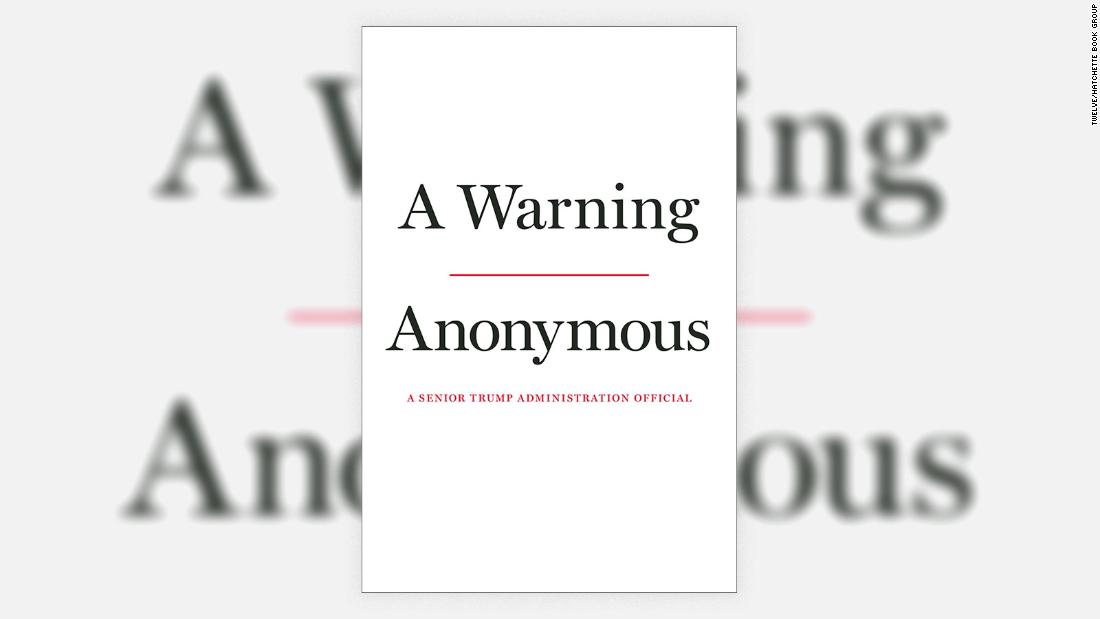[ad_1]
This exchange between a friend and “Anonymous,” the author of the notorious New York Times op-ed and now the latest edition in the burgeoning genre of Trump-lit, does not happen until nearly half the book is done. That’s a pity, because it is the question that is likely to dominate the reader’s attention throughout most of the book. Perhaps the timing of the exchange doesn’t matter, because the author’s response, of course, would still have been exactly the same.
That’s the biggest problem with the “A Warning,” written by Anonymous, an unnamed senior Trump administration official. There are no issues with new revelations (for the most part, there aren’t any) or that the ministrations required to maintain anonymity render the volume sterile and lifeless (they do). The issue is instead that while the book takes us on a greatest hits tour of near or actual catastrophes in the Trump White House, the egregiousness of these events seems to have no impact on the author’s evaluation of his or her complicity in them. The “Steady Staters,” as the lot who have stuck around to support this growing debacle refer to themselves, do not sway but continue to stay.
“A Warning,” then, is only superficially a book about President Donald Trump. The author assiduously enumerates the boss’s faults, from the crude way he refers to women to his penchant for calling officials then putting them on speakerphone for the entertainment of other officials gathered around him, to the basic infographics that mesmerize but add little to what is already known about the President. They do, however, tell us a lot about the book’s author and the group of officials that have decided that staying the course is in fact the noblest cause.
Readers might disagree with this premise and ask a deeper question about the ethics of propping up a man whom one knows to be corrupt. “He isn’t a man of great character, or good character. He is a man of none,” writes Anonymous at the end of chapter two. And yet when the members of the Steady Staters consider a mass exit, it is “deemed too risky “because it would “shake public confidence” and “destabilize an already teetering government.”
Indeed, those may be the ostensible reasons Anonymous wants to provide, but there may be others, which are, like the President himself, more self-serving. Wouldn’t it be better, one wants to inquire of Anonymous and his friends, to permit a teetering Government to fail and fall? At what point do the well-intentioned Steady Staters become so mired in the amoral filth of the White House that they cannot be distinguished from it?
It is this thorny question that lingers throughout “A Warning.” Trump supporters may be consuming the President’s permanent attitude of “let’s shake things up” with relish but the rest of us are choking a bit on the diet of constant crises that radiate from the White House. The present moment, when an impeachment inquiry promises political drama but is almost guaranteed to die in the Senate, may be a case in point. We cannot help watching, but our regular consumption of the details of a lascivious man risks eroding our own moral standards. The book provides still more; it outlines Trump’s petty belittling of others, his self-important grandiosity. In cabinet meetings, says Anonymous, Trump likes to take a vote on whether or not he should fire this or that official. On trade, Anonymous quotes him as saying, “Nobody knows more about trade than me.” On taxes: “Nobody knows more about taxes than me.” On ISIS: “I know more about ISIS than the Generals do.”
An apt analogy to it all is presented by another book, also published anonymously exactly 101 years before “A Warning.” Mary Shelley’s “Frankenstein” features a scientist named Victor Frankenstein who creates a monster. Contrary to popular belief, it is the scientist and not the monster who is named Frankenstein. The terror of the book is not the overt details of the monster, but the scientist’s own horror at the monstrosity he has created.
So it is with “A Warning.” It isn’t possible to read through it without considering Trump as the monster created collectively by a largely disinterested voting public, fed and fattened on the choreographed cruelties of reality television, and too rich and insulated to care about the consequences of even its own wars. It is a dismal picture; “A Warning” is a dismal book because the world it describes is real and consequential.
Undoubtedly, Anonymous also realizes this. In the last pages of the book, there is a perfunctory attempt to rouse an audience cowed by the weight of recounting so many of Trump’s depredations, from his toxic failure to lead after Charlottesville to his lesser known effort to label all migrants “enemy combatants” and have them sent to Cuba. “If we look within ourselves and undertake the task of moral repair,” we are told, “America can restore the soul of its political system.” If only the task of restoration and reconstruction were as easy as ending the Trump presidency. The monster, once created, Victor Frankenstein learns, cannot be done away with so easily.
Reading “A Warning” by Anonymous in the midst of impeachment proceedings highlights this last fact. The infection of mistruths that struck in 2016 has gone to bone and brain, rendered so many of us unable to distinguish between lie and truth. Against this reality, I would say to Anonymous (and the rest of the Steady Staters): staying is no longer a heroic act, but leaving very well might be.
[ad_2]
Source link



